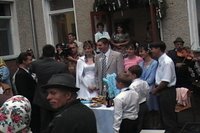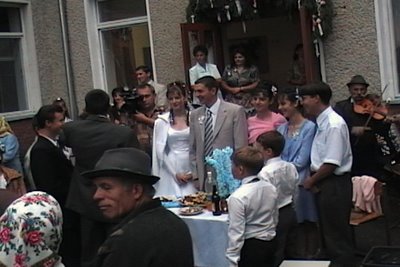This is footage from Day 3 of this year's Baltica Festival in Latvia. The Baltica Festival takes place each summer in one of the Baltic States, so every third year it is in Latvia, as it was this year. The Baltica Festivals, I believe, started in 1986 and were a major part of the movement that led to the Baltic States' independence from the Soviet Union.
The festival always takes place in a variety of locations in each of the host countries. This year it opened on a Th near the town of Sigulda; Fri it was in Riga; Sat it took place in different locations throughout the Latvian countrside, and Su it closed with a concert and ceremony in the very picturesque town of Kuldiga.
This is footage from Sat in the village of Kolka, which is located on the coast at the point where the Baltic Sea and the Bay of Riga meet in the Kurzeme or Courland region of Latvia.
More specifically, this is footage of two groups from Latgale. Latgale is a region of Latvia that has long fascinated me; it is considered by many to be the most rural part of Latvia, and it shares a long border to the east with Russia. The Latgallian dialect is quite distinct from the rest of Latvian, and Latgallians are considered a distinct group within the Latvian nation, though there is a small, small minority who consider the Latgallians a distinct Baltic ethnicity seperate from both Latvians and Lithuanians. I have heard many people--i.e., other Latvians--claim that one of the major points that makes the Latgallians distinct is the Slavic influence they have inherited in their borderland with Russia. Whatever is the case, there is a degree of similarity between, say, some Latgallian dance styles to those of their eastern neighbor, which is represented here at the end of the clip. I have seen/heard other Latvian groups play this tune while dancing in a different manner to the music.
One of the perfomers gives an explanation of his group's next song in the middle of the clip, which I have not subtitled. He explains, while speaking in more standard Latvian, that North Latgallians also differ from South Latgallians, which I presume he mentioned because of this stereotype in Latvia concerning how different Latgallians are from the rest of the Latvian bunch--well, he seems to be saying, Latgallians even differ from themselves, too! He goes on to say that the next song is an "apdziedasanas" (which I write here without the diacritical marks, as I don't have Latvian fonts on my laptop)--a song in which people sing about one another, often humorously. He says the singing of such songs is still part of wedding traditions in his, I think he meant to say,
In short, Latgallians are to Latvians what Hutsuls are to Ukrainians.
In general, I have gathered from native speakers of Latvian that they can catch on to Latgallian if they listen carefully enough.
For readers of my blog, this is a perfect example of what I mean by "real" folk music/dance performance--no Sovietski Bullshitski, nor overly arranging and/or ornamenting the music, but rather the presentation of music and dance with an authentic village-based sensibility.
I absolutely adored the orchestra of the 4 older musicians that appears at the beginning of the clip.
In the middle and at the end of the footage appears my daughter with her mama and one of Julija's buddies--they are all dressed in Livonian costumes.
For family and friends: I was part of the festival, performing with the folk ensemble Skandinieki with Zinta; Julija was with us throughout the festival. In the footage you will see her charging to the performers on stage. Julija was a frequent and quite welcomed cameo in a variety of acts during the course of the festival, and was on stage when Skandinieki performed. Listen for the crowd's laughter in this clip as Julija takes the stage.









